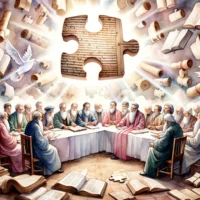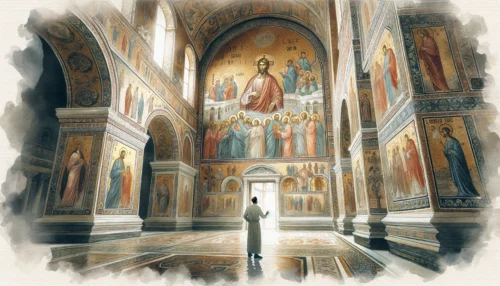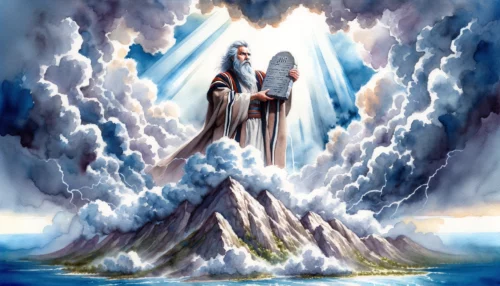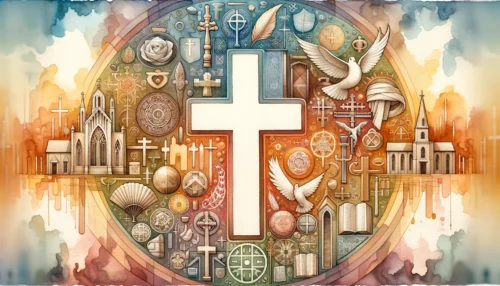As the body of Christ, we find ourselves constantly revisiting and reevaluating our understanding of our spiritual roots, often with questions pertaining to our Jewish counterparts. At the crux of these queries, we find a central and enduring concern: Are the Jewish people still God’s chosen people? This question is not only of historical and theological significance, but it also bears substantial implications for our faith and practice as believers.
Historical Perspective: The Jewish People as God’s Chosen
In our exploration of the Jewish people as God’s chosen, we must begin with a look back into the dusty pages of the Old Testament. Here, our journey commences with a covenant initiated between God and Abraham, the patriarch of the Jewish nation. God promised Abraham that his descendants would multiply like the stars in the sky, his name would be great, and that all peoples on earth would be blessed through him (Genesis 12:1-3).
Centuries down the line, we encounter Moses, who led the Israelites out of Egyptian captivity. Here, God made a distinct proclamation, declaring the Israelites as His special possession, a kingdom of priests and a holy nation (Exodus 19:5-6). This status wasn’t granted due to their number or virtue; in fact, the Bible mentions they were the least among nations. It was purely God’s grace and love that established this unique relationship, a testament to His unwavering faithfulness (Deuteronomy 7:7-8).
As we follow Israel’s history, we discover a chosen nation that often struggled to live up to its calling. There were times of obedience leading to prosperity and blessing, and instances of rebellion that resulted in chastisement and exile. Yet, in the highs and lows, one constant remained – God’s faithfulness to His chosen people. Their history was not one of human perfection but a testimony to divine commitment.
This idea becomes more vivid in the book of the prophet Jeremiah. Despite Israel’s disobedience, God spoke words of restoration and reassured His commitment to the house of Israel and the house of Judah, promising to make a new covenant with them (Jeremiah 31:31). This covenant was not about land or lineage; it signified an inner transformation, where God’s laws would be written on their hearts. It was a foretaste of the salvation yet to be revealed.
The historical perspective presents a clear image of the Jewish people as God’s chosen nation, as demonstrated through the various covenants made. Beginning with Abraham, continuing with Moses, and extending through the period of the Prophets, God’s relationship with the Jewish people was unique, rooted in grace and divine commitment. Their status as the chosen ones wasn’t because of their merits, but rather due to God’s unconditional love and faithfulness. Throughout the ups and downs of their national history, God’s faithfulness remained the unwavering constant.
New Testament Insights: The Church and Israel
The lens through which we view the relationship between the Church and Israel must necessarily be that of the New Testament. This corpus of Scripture introduces us to Jesus Christ, the long-awaited Messiah, who fulfills the promises made to the Jewish people.
At the dawn of the New Testament, we encounter Jesus, born under Jewish law, fulfilling the prophecy of the coming Messiah (Galatians 4:4). His message, initially directed to the lost sheep of Israel (Matthew 15:24), later expanded to encompass all nations through the Great Commission (Matthew 28:19). The mission of Jesus doesn’t cancel out God’s relationship with Israel but broadens God’s grace to all people.
Paul, the apostle to the Gentiles, further deepens our understanding of this expanded grace. He uses the metaphor of an olive tree to describe God’s people. While some of the natural branches (Jews) were broken off due to unbelief, wild branches (Gentiles) have been grafted in (Romans 11:17-24). It’s a picture of inclusion and expansion, not of replacement.
Paul also provides a firm affirmation about God’s unchanging faithfulness to Israel. He unequivocally asserts that God has not rejected His people and speaks about a mystery – a partial hardening has come upon Israel until the fullness of the Gentiles has come in (Romans 11:25-26). This suggests a future restoration of Israel, in keeping with God’s faithfulness to His promises.
At the end of the biblical narrative, the book of Revelation gives glimpses of a future that includes both Israel and the Church. It mentions the 144,000 from the tribes of Israel, sealed by God, alongside a great multitude from every nation, tribe, people, and language standing before the throne (Revelation 7:4-9). This envisions a future where both Israel and the Church have a place in God’s eternal plan.
The New Testament perspective reaffirms the Jewish people as God’s chosen but also expands the scope of God’s grace to include all people through Jesus Christ. Jesus, the promised Messiah, and Paul’s teachings underscore this inclusion without negating God’s faithfulness to Israel. Paul’s metaphor of the olive tree in Romans elucidates the idea of inclusion and expansion, rather than replacement. His assertion about God not rejecting Israel and the revelation of a future restoration further demonstrate God’s steadfast commitment to His promises. Finally, the apocalyptic vision in Revelation portrays a future where God’s plan encompasses both Israel and the Church.
The Everlasting Covenant: An Understanding in Continuity and Fulfillment
In the grand narrative of the Bible, one theme stands out: the covenant God makes with His people. This bond, first formed with Abraham, carried through Moses, and anticipated in the prophets, finds its ultimate fulfillment in Jesus Christ, establishing an everlasting covenant.
When we examine the Abrahamic Covenant, we see God’s promise to make Abraham a great nation, and that through his offspring, all the nations of the earth would be blessed (Genesis 12:1-3). This promise extends through Isaac and Jacob, and is inherited by the entire Jewish nation. It isn’t set aside but continues into the New Testament era.
This continuity is evident in the life and ministry of Jesus Christ. Jesus, born a Jew, is the fulfillment of the Messianic prophecies and the embodiment of the promised blessing to all nations. Through His sacrificial death and resurrection, He becomes the mediator of a new covenant (Hebrews 9:15), which, rather than replacing the old one, fulfills it, as He declares during the Last Supper (Matthew 26:28).
This new covenant through Christ extends the promise of God’s blessing and relationship to all people, regardless of their lineage or nationality. In this way, both Jews and Gentiles are grafted into the olive tree, becoming part of God’s chosen people through faith in Christ (Romans 11:17-24). This inclusion doesn’t negate the distinctiveness of the Jewish people as God’s chosen ones, but rather underscores the expansive grace of God.
The Apostle Paul expresses this profound mystery by stating that all Israel will be saved (Romans 11:26), not because they are inherently superior, but because God is faithful to His covenant. This salvation is not separate from Christ, but through Him, as He is the one who accomplishes the work of reconciliation and redemption for both Jews and Gentiles.
The everlasting covenant God makes with His people provides an understanding of continuity and fulfillment from the Old Testament to the New Testament. God’s promise to Abraham extends through Jesus Christ, who fulfills this covenant and extends it to all people. The Jewish people maintain their unique position as God’s chosen ones, but the new covenant through Christ opens up this relationship to all, Jews and Gentiles alike. The all-encompassing salvation expressed in the New Testament doesn’t replace God’s promise to Israel but underlines the expansiveness of God’s grace. The assurance of salvation for all Israel reinforces God’s faithfulness to His covenant promises, demonstrating the depth of His unchanging character.
Navigating the Tapestry of Faith
Our faith walk requires a discerning look at the rich tapestry of God’s Word, observing the vibrant threads of promise, fulfillment, and unchanging faithfulness. The narrative of God’s chosen people, the Jewish nation, and the expanded grace offered to all through Jesus Christ provides a distinct contour in this tapestry. The Jewish people’s role as God’s chosen people and the expansion of God’s covenant to all nations through Christ underline the depth and diversity of our Christian faith.
As you reflect on this topic, here are three questions to consider:
- How does the understanding of the Jewish people as God’s chosen ones enrich your perspective of God’s character and His promises?
- How does the concept of an expanded covenant through Christ affect your understanding of your own place within God’s chosen people?
- How does the continuity of God’s promise from the Old Testament to the New Testament influence your view of God’s faithfulness?
May this understanding inspire you, strengthen your faith, and amplify your awe of God’s intricate plan, masterfully woven across time. The enduring thread of His promises, fulfilled in Christ, serves as a testament to His unwavering faithfulness, illuminating our path as we navigate the manifold wonders of our Christian faith.














